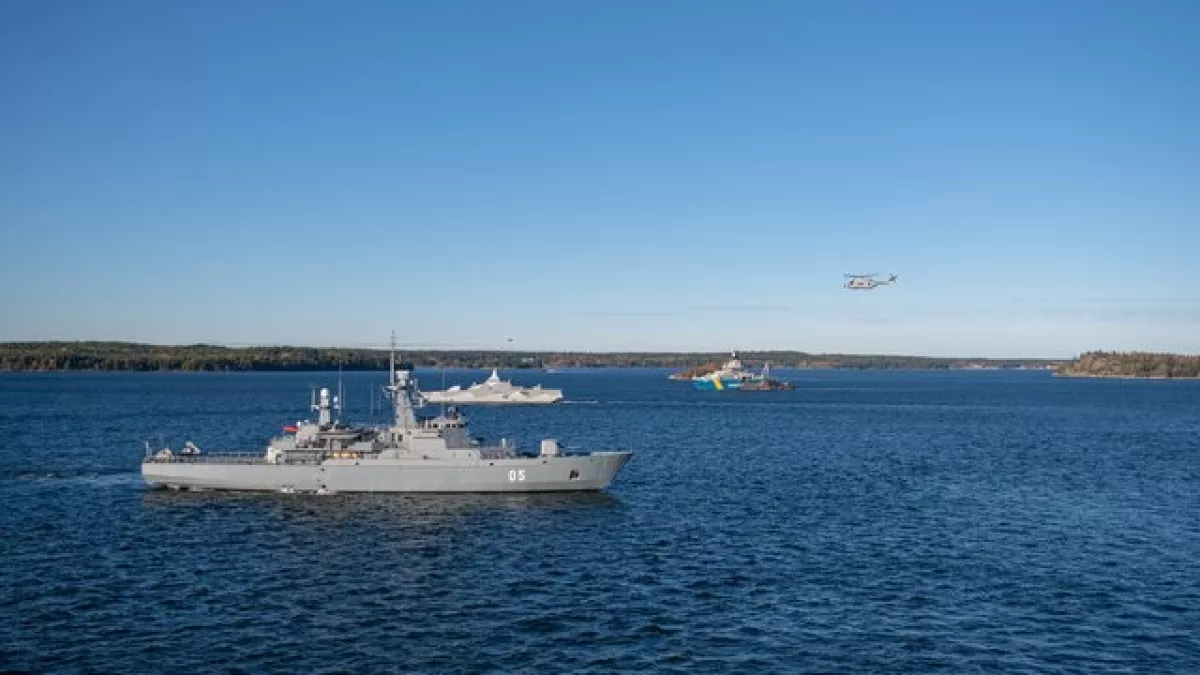NATO responds to Russian advancements in Ukraine Flanking manoeuvre
Recent events have shown that the collective West has strong counterarguments in response to Russia's attempts to achieve a breakthrough in the war with Ukraine. The strike by Russia's "Oreshnik" ballistic missile and the advancement of Russian troops in Ukraine are being countered by the West on other fronts.
One of the most important of these is the Baltic region, where NATO countries are building a strategy to limit and sever the connection between Kaliningrad and the rest of Russia, as well as to prevent Russia's access to the Baltic Sea altogether. Simultaneously, not only is the Baltic being destabilized, but the taboo on sabotages targeting international communications has also been broken. A flanking maneuver.
Chain reaction of escalation
In Eastern Europe, the potential flashpoint for a global war continues to grow. Against the backdrop of Russia's slow advance in Ukraine, the collective West is taking a broader view and does not intend to focus solely on providing assistance to Kyiv. On December 4, U.S. Secretary of State Antony Blinken reported in Brussels on the work done during President Biden's term: "We’ve doubled our presence on the eastern flank. We’ve updated our command structure. We have new defence plans that we’re implementing." He emphasized that all of this represents "long-term investments." It's not only about numbers, but also about qualitative changes. On November 13, the U.S. Aegis Ashore missile defence system in Redzikowo, Poland, was officially commissioned. This system is not only de facto aimed at stripping Russia of part of its missile arsenal, but it can also quickly shift from intercepting missiles to launching them, thus creating a threat to central Russian regions.
The U.S. Secretary of State also noted that "NATO Allies and partners of NATO are sharing the burden and shouldering even more of the responsibility. Germany, for example, just made a pledge of $680 million in new military aid. Bulgaria, Czechia, Sweden, others providing personnel to this new NATO command. All told, the United States has provided $102 billion in assistance to Ukraine, our allies and partners $158 billion. And as I said many times before, this may be the best example of burden sharing that I’ve seen in the 32 years that I’ve been doing this."

And once again, it’s important to remember that this is not just about numbers, but also about qualitative shifts in power. To confirm Blinken’s words, it is worth mentioning recent events in the Baltic: the first permanent NATO naval group recently arrived in Estonia. The group is substantial, consisting of six ships, including four frigates. Estonia's Navy Commander, Ivo Värka, stated that this group is the "main strike force" of NATO's naval power. The ships were sent mainly by countries with significant fleets, including the United Kingdom, France, the Netherlands, Norway, and Belgium.
Several days earlier, Polish Prime Minister Donald Tusk made a noteworthy proposal during a meeting with the prime ministers of the Baltic and Northern European countries: to patrol the waters of the Baltic Sea with NATO ships, much like NATO's Baltic Air Policing mission already patrols the airspace over the Baltic. His idea aligns with NATO's military planning trends, as on October 21, a new NATO naval headquarters was opened in Rostock, East Germany—commanding the alliance's forces in the Baltic Sea. De facto, this is a joint German-Polish military project preparing for the neutralization of Kaliningrad and, eventually, the establishment of control over the entire Baltic region.
Commenting on NATO's plans, Russian Presidential Assistant Nikolai Patrushev stated that the West is trying to deprive Russia of access to the Baltic Sea. In response, President Putin promised on Friday to transfer medium-range ballistic missiles to the Belarusian army by the end of next year. Given Belarus's proximity to both the Baltic Sea and the U.S. missile defence system in Redzikowo, Poland, this move significantly complicates NATO's tasks. It makes missile interception more difficult (since Belarus is so close to Redzikowo) and further challenges efforts to neutralize forces in Kaliningrad. Now, missile complexes will need to be "intercepted" not only in the small Kaliningrad region but also in the much larger territory of Belarus.

However, all of this represents military responses to military actions. The question of how to handle the new circumstances for both the region and Russia in this situation, particularly in economic terms, is not addressed by these measures. Specifically, Russia's trade must pivot eastward, a move made easier now by the warming Arctic due to global climate change. However, this shift is not without its challenges. According to the results of this year's recently completed navigation season, it was found that Russian hydrocarbon shipments to Asia via the Northern Sea Route increased by 14.5% over the year. However, they still did not reach the record level of gas transport volumes achieved in 2021, due to sanctions and a shortage of tankers.
In other words, the result for Russia is not particularly impressive, especially given that the EU plans to completely abandon Russian pipeline gas starting in January. Moscow must replace the lost gas exports to the West with LNG exports to the East, but instead, the increase in shipments via the Northern Sea Route was primarily driven by the transfer of other goods, mainly oil. Faced with problems in the western direction, Russian companies reduced oil shipments through Baltic ports.
How did it all begin?
It turns out that the radically anti-Russian forces in the EU and NATO have indeed achieved their goal, drawing NATO into the process of pushing Russia out of the Baltic. To understand this, it’s important to remember how it all began. After the collapse of the USSR, Moscow inherited a superb system of pipelines and other communications that ran through the territories of several former Soviet republics and Eastern European countries, heading toward Western Europe. In cooperation with these countries, Russia could earn revenue from exports to Europe for many years. However, Russian elites considered it beneath their dignity to pay these countries for transit. As a result, by the end of the 1990s, Moscow began negotiating direct gas and oil deliveries with Berlin, aiming to completely eliminate the need for post-Soviet, Baltic, and Polish partners. To achieve this, pipelines were laid directly on the seabed, and as this was happening, unexpectedly (or perhaps predictably?), a war began to escalate in Eastern Europe—first cold, then hybrid, and ultimately a real war.

Of course, it wasn’t just about gas. Certain circles of Russian business had other incendiary (or perhaps more accurately, incendiary-prompting) ideas—such as, in the late 2000s, the proposal to build a parallel port infrastructure in the Leningrad region and deprive the Baltic States of income from maritime transport. This idea was put into action without much deliberation: Russian cargo began to leave the region, and then Russia started putting pressure on Belarus to exit the Baltic States as well. At the same time, political forces in the Baltic region advocating for cooperation with Russia suddenly (or perhaps predictably?) began to crumble.
These examples may trigger a sense of déjà vu from a history textbook. After all, the large court businesses in the Russian Empire led it into an unnecessary war with the initially friendly Japan at the beginning of the 20th century, attempting to push Japanese economic interests out of the Japanese-colonized Korea. In general, we see something similar again, but no one remembers the long history. Instead, there are tales about how primitive Russophobia (which, of course, does exist in certain places) leads to confrontation, though this is more likely a consequence of the long-standing, even in the Yeltsin era, deep contempt for Eastern European "limitrophes" as parasites unworthy of being partners, which has led Russia to its current bloody deadlock in the Eastern European region.
There is no doubt that external players have always been willing to play against Russia through the hands of Eastern Europeans, but it was the incorrect, disrespectful attitude towards neighbours, which became ingrained in the Russian elite after 1991, that created great opportunities for external players to pursue their plans. Now, they can implement these plans right on Russia’s doorstep, near its central regions. As a result, the danger is growing for Russia and all countries in the region—while external players alone benefit. Compared to the dangerous situation Russia is facing now in the Baltic region, the capture of a small part of the Kursk region by Ukrainian forces seems insignificant. However, this situation is dangerous not only for Russia but for the countries in the region as well.
Underwater warfare
A recent example is the security of underwater communications. In mid-November, NATO held its first-ever exercises to counter underwater vessels in the Baltic Sea. Such manoeuvres are regularly conducted in the Mediterranean and North Seas. The initiation of regular exercises in the Baltic demonstrates the collective West’s readiness to continue escalating military activity closer to Russian borders. Notably, the "Merlin-24" exercises were led by influential countries from "Old Europe," rather than just radical governments from Eastern Europe, as seen in the list of participants: the United States, the United Kingdom, France, Germany, Belgium, the Netherlands, Sweden, and Portugal. However, "New European" countries would likely have eagerly joined, but their military capabilities are limited.

The new exercises clearly signal the intention to limit the operations of Russian submarines and underwater drones in the Baltic Sea. At first glance, the Baltic seems too shallow for submarines, but the constantly changing seabed, with numerous shipwrecks, complicates surveillance. At the same time, the Baltic offers plenty of tempting targets for underwater operations—gas pipelines, oil platforms, and telecommunications cables, not to mention the maritime routes passing through it. As a result of actions by some radical EU-NATO countries in cooperation with Ukrainian partners, the sabotage of the Nord Stream pipeline in 2022 set a precedent for attacks on critical international infrastructure. No one was punished for the sabotage, and while it seemed like a significant blow to Russia, it was one that it could not even respond to.
However, as a result, the "Pandora's box" was opened, and soon there were accidents involving EU-NATO communications. On November 17, a Chinese vessel dragged its anchor along the Baltic Sea floor for 111 miles, severing first the fibre-optic cable between Lithuania and Sweden, and then one between Germany and Finland. Western authorities believe that neither the Chinese government nor the vessel's Chinese owner were responsible for the incident and that a Russian crew member may have acted on the instructions of Russian intelligence services.
A year earlier, in October 2023, another Chinese vessel's anchor damaged the Balticconnector gas pipeline, which supplies the Baltic States with non-Russian gas, as well as telecommunications cables connecting Estonia to Finland and Sweden. China recently acknowledged the responsibility of its sailors but claimed it was an accidental mistake. In other words, the sabotage of the Nord Stream pipeline didn’t only harm Russia—everyone lost, because the strike ultimately was against the very idea of a "rules-based order."
Brutality and lawlessness as the new norm
To summarize: the irresponsible escalation by all sides in the Eastern European crisis is undermining the last remaining international norms. We have already become accustomed to months-long shelling of nuclear power plants, the use of cluster munitions in civilian areas, mass arbitrary punishment of entire populations based on citizenship, and so on. Against this backdrop, violations of maritime law, such as depriving countries of access to the sea or destroying maritime communications, seem less alarming. However, if this becomes the norm, the consequences could lead to global catastrophes, as the entire world trade system, which currently relies on maritime communications, would collapse. The disruption of air communications across Eurasia has already led to inaccessible tickets, unstable connections, and even the decline of these communication channels. Rail transport has also collapsed due to rising confrontation and the pandemic (where liberal political correctness was upheld but measures were introduced that destabilized entire regions of the planet).
Therefore, international trade and communication could sharply decline very soon due to the already accomplished fact of "removal" of several key elements of their infrastructure. The world is closing itself off within national and bloc borders, increasing military spending. No one has weapons that guarantee victory, but an increasing number of countries possess weapons that guarantee the onset of world war and, possibly, the nuclear end of humanity. Unlike in the past, no one even speaks of this danger on a global level.








